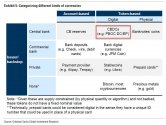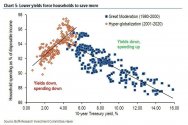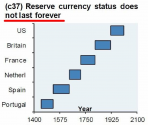(... cont'd)
LAST AUGUST China's Commerce Ministry had released fresh details of a pilot program for the country's central bank digital currency (CBDC) to be expanded to several metropolitan areas, including Guangdong-Hong Kong-Macao Greater Bay Area, Beijing-Tianjin-Hebei region, and Yangtze River Delta region. This was the inevitable culmination of a process which started back in 2014 when it's reported at the time, "China Readies Digital Currency, IMF Says "Extremely Beneficial".
Fast forward a few months when China's preparations to rollout a DIGITAL YUAN gathered pace, and in October that China was poised to give legal backing to the launch of its own SOVEREIGN DIGITAL CURRENCY, "cementing its trailblazer status in virtual currencies far ahead of other countries, after already recently experimenting with large-scale trials of actual payments by consumers, which was met with mixed results." Specifically, the South China Morning Post reported that "The People’s Bank of China published a draft law on Friday (23 OCT 2020) that would give legal status to the DIGITAL CURRENCY ELECTRONIC PAYMENT (DCEP) system, and FOR THE FIRST TIME the DIGITAL YUAN has been included and defined as part of the country’s SOVEREIGN FIAT CURRENCY."
China moves to legalise digital yuan and ban competitors with new draft law - SCMP 2020-10-27
This in turn brought us to the so-called "Shenzhen case study" when IN OCTOBER OF 2020, China became the first nation to hold a trial run of its digital currency, when the government in Shenzhen carried out a lottery to give away a total of 10 million yuan (about $1.5 million) worth of the digital currency (nearly 2 million people applied and 50,000 people actually won).
The winners were required to download a digital Renminbi app in order to receive a "red packet" worth 200 digital yuan ($30), which they can then spend at over 3,000 designated retailers in Shenzhen’s Luohu district, according to China Daily. After that, they’ll be able to buy goods from local pharmacies, supermarkets and even Walmart.
The idea was to NOT ONLY TEST THE TECHNOLOGY INVOLVED, but BOOST CONSUMER SPENDING in the wake of the pandemic. In short, China is not only subsidizing the centrally-planned economy by adjusting the SUPPLY-SIDE of the question- it now can PROP UP DEMAND by handing out digital currency to anyone (or everyone).
Of course, unlike traditional central bank account-based currencies such as reserves, or the myriad decentralized cryptocurrencies like bitcoin, China’s DIGITAL CURRENCY would be controlled by the country’s CENTRAL BANK and will be instantly made available at a moment's notice to anyone who can receive it.
And since "China's adoption of digital central bank tokens is EXPECTED TO BE SEAMLESS as most of the nation's digital payments already pass through companies like TenCent WeChat Pay and Alibaba AliPay and are already very popular in the country", it's concluded that "the successful Shenzhen test means that a broad rollout is just a matter of time."
IN FEBRUARY 2021, the protector of the dollar reserve system, SWIFT (Society for Worldwide Interbank Financial Telecommunication), the global system for FINANCIAL MESSAGING and CROSS-BORDER PAYMENTS, has set up a joint venture with the Chinese central bank’s digital currency research institute and clearing centre, in a sign that China is exploring global use of its planned digital yuan.
ACTUALLY, not just "exploring" but thanks to YEAR OF TESTING and partial rollouts, Beijing was about to become the first country in the world set to launch the DIGITAL YUAN, and with both the IMF's and SWIFT's blessing, it's said that it was "just a matter of months if not weeks."
Just a few days ago, China's "cyber yuan" became official when the Wall Street Journal finally caught up, writing
"China Creates Its Own Digital Currency, a First for Major Economy."

While regular readers are quite familiar with the details and chronology of China's transition to a DIGITAL CURRENCY, which incidentally is PRECISELY THE OPPOSITE of a cryptocurrency and has ABSOLUTELY NOTHING TO DO with Bitcoin, the WSJ focuses more on the GEOPOLITICAL REASONS of China's currency evolution - as a reminder, thousand years ago, when money meant coins, China INVENTED PAPER CURRENCY, and now the Chinese government is minting cash digitally, in what the WSJ said is a "re-imagination of money that could shake a pillar of American power" - and specifically how to approach a decoupling from the global reserve currency, the US dollar so not only can Beijing avoid the "NUCLEAR OPTION", a WEAPONIZED US DOLLAR, but allow countries that the US seeks to punish like Iran, a viable alternative. Here is the WSJ:
The U.S., as the issuer of dollars that the world’s more than 21,000 BANKS need to do business, has long demanded insight into major cross-border currency movements. This gives Washington the ability TO FREEZE individuals and institutions out of the global financial system BY BARRING BANKS from doing transactions with them, a practice criticized as “DOLLAR WEAPONIZATION.”
…
The DIGITAL YUAN could give those the U.S. seeks to penalize a way to exchange money WITHOUT U.S. knowledge. Exchanges wouldn’t need to use SWIFT, the messaging network that is used in money transfers between commercial banks and that CAN BE MONITORED by the U.S. government.
To be sure, a credible alternative to the dollar, reduces the need to hoard the currency for US trade partners which in turn would have profound implications on GLOBAL SAVING PATTERNS, from there, global capital flows.
The consequences for the PERPETUAL US current account DEFICIT would be unprecedented.

And there you have it: the KEYNESIAN WET DREAM to BOOST THE VELOCITY of mean finally comes true. For the past decade we have joked that it is only a matter of time before central banks slap on an expiration date on every monetary unit in circulation... to offset the creeping petrification of the monetary system, where NEGATIVE INTEREST RATES have sparked EVEN MORE SAVING and NOT SPENDING as central banks had intended...

As a reminder, according to tentative estimates for the rollout of ISO 20022, which is the required UNIVERSAL TRANSACTION STANDARD which will make payment in DIGITAL CURRENCIES possible, we are looking at a 2022 launch date, although China looks ready to go live as soon as this year.
There is one final, geopolitical reason behind China's decision to give its digital currency an expiration date: as Byrne Hobart writes, "programmable money, tied to real-world identities, and universally tracked by a central bank, starts to look suspiciously like a substitute for the consumer of last resort.
Every year that China gets richer, DOMESTIC CONSUMPTION PLAYS A BIGGER ROLE (exports were 26% of China's GDP in 2010, and 18% last year). If domestic consumption can be tightly controlled, then it's a way to not just increase the volume of consumption but to control the variance of demand for the goods China produces. It's not yet enough to match the size and variability of global demand for China's exports, but every year it gets closer."
In short, while the US and China are BOTH TALKING SERIOUSLY ABOUT DECOUPLING, the DIGITAL YUAN - which is now a reality - indicates that China's government is not only more effectively planning for it, but will be the first to fully sever all ties with the US... when the moment comes.
RABOBANK's WIM BOONSTRA explaining not only why China will be the first country to launch a digital currency but also looking at what happens next:
China Will Be The First Country To Launch A Digital Currency: What Happens Then
- China may be the first major country to launch a central bank digital currency or CBDC
- The Chinese CBDC, named DCEP, will strengthen the position of the central bank and help to further modernize the Chinese economy
- The DCEP will probably also be available for China’s trade partners, to begin with Africa
- The DCEP may strengthen the international position of the renminbi to the detriment of the euro
- The arrival of the DCEP should be a strong wake-up call for Western, especially European, policymakers
* * * * *





